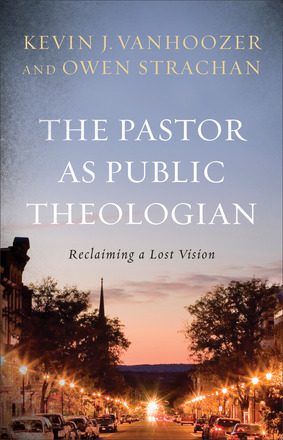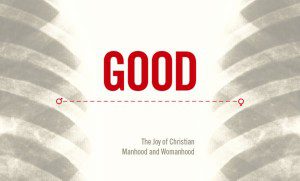In the beginning, God made the heavens and the earth. Many evangelicals know the words of Genesis 1:1 by heart–but fewer have recognized the full ontological and metaphysical significance of this verse’s claim. In the beginning, Genesis teaches us, God not only made matter, he made order. In creating the cosmos ex nihilo, he ordered it–that is, he gave form and structure and coherence and beauty and symmetry to it. Order is not incidental to Christian doctrine; order is central. God is the maker and ruler of all things; the creation is distinct from him, yet exists by the super-sustenance of his Son (Colossians 1:17); the world in which we dwell is not characterized in fundamental terms by randomness and disorder, but by divine design.
All this matters greatly for our understanding of men and women, those who image the Lord (Genesis 1:26-27). The man is created first in the Old Testament, and possesses what the New Testament will call headship over his wife. Adam is constituted the leader of his home; he is given authority in it, authority that is shaped in a Christlike way as the biblical story unfolds. According to the apostle Paul, a godly husband does not lord his role over his wife, but rather sees his headship in cruciform terms. He dies to himself over and over in order to love his wife and children well (Ephesians 5:22-33). This does not mean that he fails to exercise actual on-the-ground leadership or make decisions; it means that he constantly seeks to shepherd his wife and family so that they will flourish in Christ. On the basis of a man’s domestic leadership, men are called to provide spiritual leadership and protection of the church (1 Timothy 2:9-15). Elders preach, teach, and shepherd the flock of God; only men are called to the office of elder, and only men who excel as heads of their wives and children are to be considered as possible candidates for eldership (1 Timothy 3:1-7; Titus 1:5-9).
Preaching Order in an Age That Despises it
The preceding (fleshed out in my forthcoming book Reenchanting Humanity) gives voice to the order of God’s world. There is physical order in the cosmos; there is also social order, and spiritual order. There are things that are right based on God’s creative design, and there are things that are wrong. It is right for men to lead their homes, and put their lives on the line when their family members are endangered, and work hard to be the financial pillar of their loved ones. It is right for women to be distinctively feminine, bear and raise children as God allows, submit to and support their husbands per 1 Peter 3, and serve their churches in ways that use their gifts. Living out these realities is good and glorious, and shows us the beauty of the Christian worldview over against secular conceptions of the sexes.
Our culture today does not embrace divine order in either scriptural form or natural form. Our culture is anti-order. Think of what Christopher Hitchens once wrote: “We atheists do not require any priests, or any hierarchy above them, to police our doctrine.” In Hitchens’ mind, the greatest evil is not the priest, but hierarchy–another word for divine order. The very theory that is now taught as secular wisdom, evolution, depends on chaos, randomness, and no greater creative intent in the known world. In evolutionary thought, there is no maker. There is no design. There is no telos (end) for humanity. If there is male and female, there is no meaning behind the “genders.”
Evangelicals Need Help: The Meaning of Manhood and Womanhood
Many evangelicals have little idea how to respond to the view just described. They have had very little grounding (in some cases) in the order of creation. They know God created the earth, but they haven’t heard much more than that. They sense that homosexuality is sinful, but beyond a few biblical citations, they do not have a doctrinal position on the matter. They know there are men and women, but they have heard little about divine design. But this design, this order, is vital. Grounded in theistic ontology itself, it is the very bedrock of Christian theology and the Christian worldview. You could say it this way: there is order in the home; there is order in the churches; there is order in the world God has made.
In terms of local church polity, God does not tell us to select leaders according to gifting and talent. The Lord working through the Spirit calls only godly men to provide spiritual leadership, shepherding, and teaching for the gathered assembly of God’s people (see 1 Corinthians 14:34-35). All this, as we have said, is spiritual and ecclesial order. It is dependent on God’s making of the sexes: Ἀδὰμ γὰρ πρῶτος ἐπλάσθη εἶτα Εὕα–“for Adam was formed first, then Eve,” Ἀδὰμ being the first word in the Greek text of 1 Timothy 2:13. Men preach in the church, Paul teaches, because Adam was made first, and Adam was not deceived by the serpent (1 Tim. 2:14). The verse flow mirrors the flow of thought: the breakdown of creation order in the garden of Eden led to the deception of the woman and the fall of humanity. The stakes are terrifyingly high when it comes to the design of God in the world of men.
Scripture and History: Men Are Called to Shepherd and Instruct the Corporate Body
Biblical teaching on the sexes is not bad. It is not harmful to women. It is good–thunderously good–for women and for men. If we take the Bible at its word, then we recognize that there is no way for a woman to instruct the gathered church, whether in an authoritative or “non-authoritative” way. Congregational preaching and teaching is authoritative, for the Word of God is authoritative. There is no “non-authoritative” way to preach and teach the Bible. Any who doubt this point might recall how Paul contrasts the “word of men” with the “word of God” in 1 Thessalonians 2:13. If you speak and interpret the Scripture, you speak with the weight of eternity upon you. It cannot be otherwise.
Beth Moore and J. D. Greear are two popular Southern Baptist voices. Both Moore and Greear are gifted individuals, respected within the SBC and beyond it. In recent days, I was surprised to see these two figures endorse, in the context of the church’s gathered worship service, a woman teaching and preaching to the corporate body (see here and here). This was new to me; Southern Baptists have never embraced such a view. As mentioned above, there is no New Testament precedent for a woman teaching the corporate body of Christ (Priscilla’s words in Acts 18 to Apollos came in private, not in public), nor were women called to serve as priests in the old covenant era. Christ did not appoint a woman to be an apostle, nor did any woman serve as an elder in the first-century churches spoken of in Scripture.
To be sure, women contributed much to the life of the early church (and to the Southern Baptist Convention in its history). Women were the first eyewitnesses of the resurrection; women blessed the early ekklesia in numerous ways by serving and worshipping Christ in an all-of-life way; women were enthusiastic members of Christ’s church, lifted out of the bondage they experienced in the secular Greco-Roman world. (For any who say biblical Christianity represses women, graciously bring them up to speed on how Roman men could abuse and possibly even kill their wives without legal action.) The New Testament prizes the contributions of women according to the design of God: if older women are not presently discipling young women in the faith, the local church is not functioning rightly. So Paul says: “In the same way, older women are to be reverent in behavior, not slanderers, not slaves to excessive drinking. They are to teach what is good, so that they may encourage the young women to love their husbands and to love their children, to be self-controlled, pure, workers at home, kind, and in submission to their husbands, so that God’s word will not be slandered.” (Titus 2:3–5 CSB).
The teaching older women should offer young women according to Paul is discipleship-focused, we note with care (exegetical care is the foundation of faithful Christian ministry–see 2 Timothy 2:15). This teaching is targeted teaching: it is oriented around godly character, godly marriage, godly mothering, and godly homemaking. The older women in view here are not explicitly called to provide doctrinal shepherding, nor to form ministries beyond the church; they are called in Paul’s own words to offer younger women counsel and help and wisdom as these younger women respond to God’s call to make a family and make a home.
What About Mother’s Day?
All the preceding means that women have much to contribute to the life of the local church and the work of the kingdom. In terms of ministry and Christian testimony, women are free, gloriously free, to evangelize, witness to the glory of God in the secular workplace, and serve on the mission field (ideally on teams populated by men who can serve as pastors). Yet we cannot miss this: the scriptural focus on feminine domesticity means that the church joyfully promotes “homemaking” as a glorious call of God. Whatever a secular culture says, the Lord loves motherhood, wifely submission to a husband “in everything” (Ephesians 5:24), family-building, and the training of children to know Christ.
Whether a woman is called to marriage or singleness, women should not preach or offer public teaching in the gathered worship service in local churches. The call to local church leadership is not dependent upon gifting or talent; it is based on the creation order of almighty God. For a woman to teach and preach to adult men is to defy God’s Word and God’s design. Elders must not allow such a sinful practice; to do so is to bring the church body into disobedience against God. Southern Baptists have no such historic practice; John Piper has encouraged no such practice, nor has any leading complementarian affiliated with the Council on Biblical Manhood & Womanhood; the early Baptists, Reformers, Puritans, Edwardseans, and confessional Presbyterians and Anglicans never made such a move. Men are called to provide the public preaching and teaching of the Word, which is the work of elders. This is true on Mother’s Day; it is true on every Sunday of the year.
Conclusion
Though many paint women monolithically today, seeing them as instinctually feminist, there are many women in submission to God who wish for men to lead them well and preach the Word faithfully. They do not see the Bible’s teaching on womanhood as “restrictive,” nor the complementarian movement as “afraid” of womanly gifting. Rather, they approach the Word of God with great reverence and awe. They wish to know the will of God, and do it. They take no pleasure in quieting or softening the Bible; they recognize the order that God has established, and they love it. There are scores of such women in church history, in Baptist history, in the modern SBC, and in the broader evangelical world. I know they are out there; I have heard their testimony firsthand. With the whole church of God, these women gladly confess that the counsel of the Lord stands forever (Psalm 33:11), and that the law of God’s mouth “is better…than thousands of gold and silver pieces” (Psalm 119:72).
There is much the Word frees women to do as mentioned above. But for the women I speak of, where the Word gives them a prohibition for God’s glory and their good, they receive that commandment with gladness. They submit to God, as we all must do (James 4:7). In our God-defying age, this posture stands out sharply. It is driven by our total confidence in the unerring mind and will of God. We think of Psalm 119:89 on this count: בַּשָּׁמָֽיִם נִצָּ֥ב דְּ֝בָרְךָ֗ יְהוָ֑ה לְעוֹלָ֥ם, “Forever, Lord, your word is fixed in the heavens.” It is not man who has “fixed” the word of God, and written it in the sky. By God’s own hand and mind, there is order in the home; there is order in the churches; there is order in the world God has made.
Let no one defy this order.











